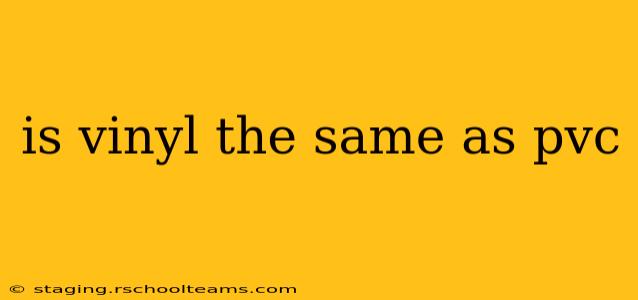Is Vinyl the Same as PVC? Understanding the Relationship Between Vinyl and PVC
The short answer is: yes, vinyl and PVC are essentially the same thing. However, the terms are often used interchangeably, leading to some confusion. Let's delve deeper into the relationship between these two materials.
PVC stands for polyvinyl chloride. Vinyl is simply a more common and commercially friendly term for polyvinyl chloride. Think of it like Kleenex and facial tissues—one is a brand name, and the other is the generic term. PVC is the chemical name, while vinyl is the more widely used marketing name. They both refer to the same durable, versatile plastic material.
What are the properties of vinyl/PVC?
Vinyl or PVC is known for its:
- Durability: It's resistant to weathering, chemicals, and impact, making it ideal for a wide range of applications.
- Versatility: It can be molded into various shapes and forms, from rigid pipes to flexible flooring.
- Affordability: It's relatively inexpensive to produce, contributing to its widespread use.
- Maintenance: It's relatively low maintenance and easy to clean.
What are the different uses of vinyl/PVC?
The versatility of vinyl/PVC leads to a broad spectrum of applications, including:
- Construction: Pipes, windows, siding, flooring, roofing membranes.
- Packaging: Bottles, films, containers.
- Clothing and Accessories: Raincoats, handbags, shoes (often in combination with other materials).
- Medical Applications: Blood bags, tubing, gloves.
- Automotive: Interior components, upholstery.
Is vinyl/PVC safe?
The safety of vinyl/PVC is a complex issue. While it's widely used and generally considered safe in many applications, some concerns exist regarding:
- Phthalates: These are plasticizers often added to PVC to increase flexibility. Some phthalates have been linked to health concerns, though regulations and safer alternatives are now more common. Look for "phthalate-free" products if this is a concern for you.
- Manufacturing Process: The manufacturing process can release harmful byproducts, although modern production facilities employ stricter environmental controls.
- Disposal: PVC's durability also means it's difficult to recycle and can persist in the environment for a long time. Proper disposal methods are crucial.
What's the difference between rigid and flexible vinyl/PVC?
The flexibility of vinyl/PVC depends on the additives used during production. Rigid PVC is hard and strong, suitable for things like pipes and window frames. Flexible PVC is softer and more pliable, used in applications like flooring and clothing.
How is vinyl/PVC recycled?
Recycling vinyl/PVC is challenging due to its chemical composition. However, some facilities do accept certain types of PVC for recycling, often separating it by type and color. Check your local recycling guidelines for details on what types of vinyl/PVC are accepted in your area.
In conclusion, while there's a technical distinction between the chemical name PVC and the more common term vinyl, they refer to the same material: a versatile, durable, and widely used plastic. Understanding its properties, uses, and potential environmental concerns is crucial for making informed choices.
